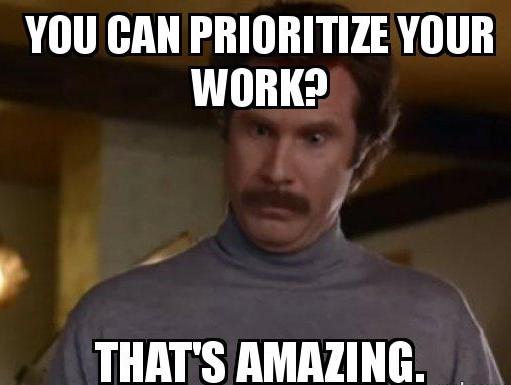5 Ways to Help you Bounce Back When Life Happens
Learn 5 strategies that will help you make more room in your life and bounce back faster when something unexpected happens.

As much as we hate to admit it, we don’t have control over every little thing that happens in our lives. Most days we have a general idea of what to expect, but there is almost always something that happens to throw a wrench in things. In my world, it is usually a minor thing. Bad traffic; a customer has a software-related problem that needs immediate attention but takes a few hours to solve; a meeting or two gets rescheduled which means I don’t have time to work at my desk; my cat, Toby, decides 4:00 AM is a great time to get up and will not let me go back to sleep (resulting in zombie-brain for the rest of the day). In the grand scheme, all of these are no big deal, but they are all disruptors to a well-imagined schedule.

If we take it a step further like when we get sick (or you have sick kids to take care of) and you lose whole days, it can really make a mess of a perfectly sectioned week. I don’t know about you, but I think my husband and I have said million times: “I don’t have time to be sick”. I have definitely been guilty of jam-packing my calendar and then being a little horrified when I can’t keep up with the commitments I have made and I have to make adjustments.
And if we take it even further, what about when something serious happens? Like an illness beyond the flu, or a relationship issue like separation or divorce, or even a death. Those are not one-and-done situations. They are often both physically and emotionally draining, distracting, and can take a long time to resolve to the point that you are back to ‘yourself’. I, unfortunately, experienced this first hand when my husband was diagnosed with cancer in September 2012. Our entire life was thrown for a loop and stayed like that for over a year. I was in no way prepared for what we went through and in many ways just flew by the seat of my pants and with the kindness and support of the people in our lives.

A symptom of our culture of busy is that we don’t leave room in our lives for the unexpected. We pack every moment of every day with tasks, events, and commitments, and then feel bad when we can’t keep up with them. The result is that when something unexpected comes up, the impact on our lives is magnified.
In many ways, this is a situation of “expect the unexpected” but in the frame of “be prepared for the unexpected”.
How can we leave space in our lives for the unexpected so we can mitigate the impact, bounce back faster, and even make time for self-care?
1. Adjust your expectations of self

Contrary to popular belief, you are not a superhero. We, as fallible humans, are not able to maintain ourselves at 100% all the time. Trying to will just lead to failure and likely burnout. Some days we are super productive and other days not-so-much. It is a completely unrealistic expectation that every day is going to be kicking ass and taking names. There are too many factors involved that impact how you are going to feel on any given day. We have some control over those factors like eating well, exercising, getting a good sleep, etc., but we cannot control those things all the time.
We all need to cut ourselves some slack and give ourselves permission to not be super-human. Have an off day, and try to follow it with a better one.
2. Book unscheduled time in your calendar
I have mentioned this many times in a few different posts, but if you book unscheduled time (which is indeed an oxymoron), it does 2 things:
- Gives you time to recharge, in whatever form that takes.
- Gives you space when something unexpected does come up.
This is something I often use as a self-care tactic. Instead of time-blocking for a task or TODO, I have a visual reminder in my calendar to keep some time open. I don’t often need to use these blocks for anything other than downtime, but I am always grateful that I have them. They keep me from being ridiculous and booking myself straight to burnout.
3. Prioritize

When something inevitably does happen to pull you away from your carefully constructed schedule, like getting sick, you need to take a look at your TODOs /schedule and prioritize what needs your immediate attention and what can wait/be rescheduled. This is often harder than it sounds because EVERYTHING seems important.
One of the mental tricks I use to help me prioritize when things go sideways and I am feeling overwhelmed is to imagine what the worst-case scenario consequence is if something doesn’t get done. This helps me get a more realistic sense of what I actually have to get done, what can be ignored for a bit, and what I can delegate (more on this below). Especially when recovering from burnout and sickness, there are very few things in our day-to-day that can’t wait.
I have made this point before, but I think it bears repeating: If you don’t take care of yourself, you are not at your best to take care of the people/things that are most important to you. Give yourself room to be sick or tired or whatever so that you can get back to being your awesome self. Otherwise, you just end up prolonging your recovery even further.
4. Delegate

Truth be told, there are parts of your life that you have taken responsibility for that can be handed over to someone else. We all like to think we are the best person to do most jobs…but we often aren’t. Even if we are, there are others who can pick up some slack when we need it.
For example, I remember a particular moment when my husband was about a quarter of the way through his cancer treatment that I decided I needed to delegate the cleaning of our house.
It was about 9:00 PM the night before I was picking him up from the Cross Cancer Institute after a 6-day treatment. I had been running our business each day and visiting him each night after work. I came home and realized that our house was not in a great state and needed to be cleaned. I got to work and after about an hour, after dragging the vacuum up from the basement, I sat down at the foot of the stairs and started to cry. I was just so tired… but I wanted the house to be clean and nice for him when he got home. I remember sitting there and thinking “I just can’t do this all myself, but it still needs to be done..what am I going to do?”. It was at that moment that I decided we needed to hire a house cleaner.
I left the vacuum where it was and went to bed. The next morning, I texted some friends I knew had a cleaner they liked and got her information. It was one of the best decisions I ever made.
5. Ask for help
The step beyond delegation is straight-up asking for help. Many of us are type A control freaks who like to do everything ourselves. This is a silly thing that seems to be built into North American culture. Asking for help equates to weakness, or at the very least an inconvenience to others. We don’t want to be a “bother” and we would rather suffer alone than admit we need help. I am absolutely guilty of this. Looking back, even when I was supporting Dana through his cancer treatment I didn’t do a good enough job of asking for help. I managed ok, but I know I could have managed better.
I think that we can all identify situations where we could have (should have?) asked for help but didn’t. We suffered through. We didn’t have to.

Here’s the thing: I know at least a dozen people that, if they called me, I would drop everything to help them move, watch their kids, pick them up, listen to them vent, etc. I bet you can think of just as many people that you would help if asked. But no one ever calls. We are all being a little silly.
I think the actual lesson is if someone can’t help you, for whatever reason, they will say so. Most of the time they are happy to. We just need to ASK.
Summary
Life is full of curveballs. Some are bigger than others. Some hit harder than others. If we make space in our lives for them, they will be easier to handle and hit out of the park (baseball metaphor FTW). By adjusting our self-expectations, setting aside unscheduled time, realistically prioritizing, delegating and asking for help, we can manage unexpected situations as they come up and bounce back more effectively.
Share
Ashley Janssen

Productivity consultant, writer, speaker, serial entrepreneur, chaos calmer, introvert, cat-lady. Lover of books, fitness, old fashioned’s, basketball, and video games.
Follow me on
Twitter
or
LinkedIn.
Hire me for
1 on 1 productivity consulting
or
speaking.
Related articles

What It Really Means To Be Calm

Preparing For The Long Winter Ahead


Comments ()